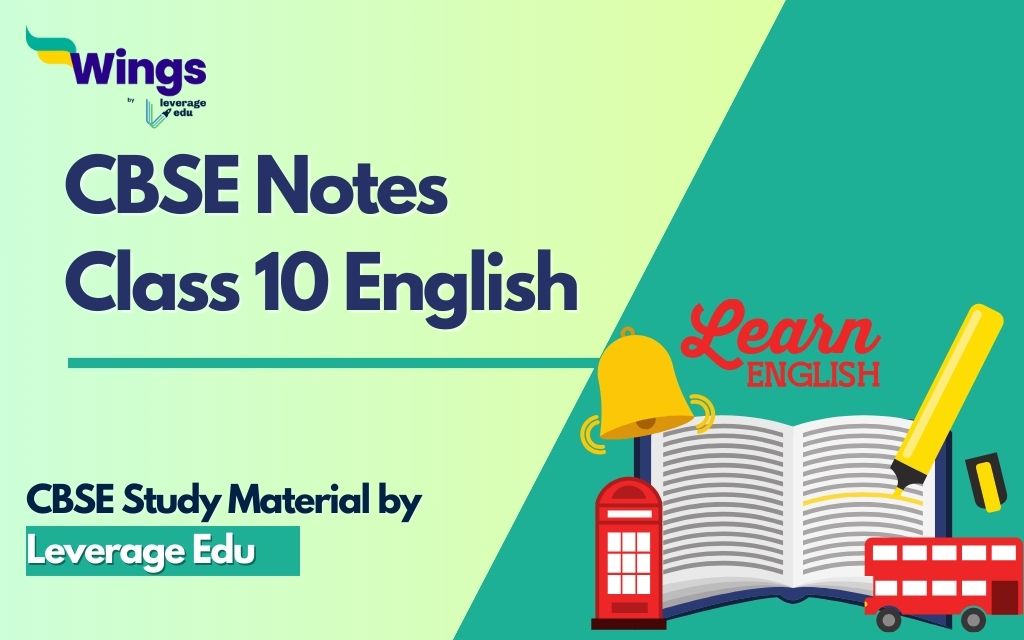Your learning process will be made simple by using our accurately written CBSE Notes Class 10 English. These expert-written notes are written in an approachable manner, in points and include all the essential material. NCERT Notes for Class 10 English also includes important questions and answers, and textbook exercises for each chapter.
Also Read: 160+ Best & Easy English Speech Topics for Students
Contents
CBSE Notes Class 10 English First Flight
CBSE Class 10 English Textbook chapters as per the later CBSE notification released for the Class 10 English (184) syllabus are mentioned below. You can access the summarised notes of all chapters of First Flight here:
First Flight Textbook Class 10 English Notes
Here are summarised notes for each chapter of the ‘First Flight’ textbook:
| Chapter 1: A Letter to God; Poem 1: Dust of Snow; Poem 2: Fire and Ice |
| Chapter 2: Nelson Mandela – Long Walk to Freedom; Poem 3: A Tiger in the Zoo |
| Chapter 3: Two Stories About Flying; Poem 4: How to Tell Wild Animals; Poem 5: The Ball Poem |
| Chapter 4: From the Diary of Anne Frank; Poem 6: Amanda! |
| Chapter 5: Glimpses of India; Poem 7: The Trees |
| Chapter 6: Mijbil the Otter; Poem 8: Fog |
| Chapter 7: Madam Rides the Bus; Poem 9: The Tale of Custard the Dragon |
| Chapter 8: The Sermon at Benares; Poem 10: For Anne Gregory |
| Chapter 9: The Proposal (Play) |
Downloadable PDF of Important Questions and Answers in First Flight
You can download NCERT Solutions Class 10 English questions and answers for each chapter of the “First Flight” textbook:
| Chapter 1: A Letter to God; Poem 1: Dust of Snow; Poem 2: Fire and Ice |
| Chapter 2: Nelson Mandela – Long Walk to Freedom; Poem 3: A Tiger in the Zoo |
| Chapter 3: Two Stories About Flying; Poem 4: How to Tell Wild Animals; Poem 5: The Ball Poem |
| Chapter 4: From the Diary of Anne Frank; Poem 6: Amanda! |
| Chapter 5: Glimpses of India; Poem 7: The Trees |
| Chapter 6: Mijbil the Otter; Poem 8: Fog |
| Chapter 7: Madam Rides the Bus; Poem 9: The Tale of Custard the Dragon |
| Chapter 8: The Sermon at Benares; Poem 10: For Anne Gregory |
| Chapter 9: The Proposal (Play) |
Also Read: Spoken English: Tips & Tricks to Speak Fluently
CBSE Notes and NCERT Solutions Class 10 English Foot Prints without Feet
The Class 10 English supplementary book ‘Foot Prints Without Feet’ includes 9 chapters. You can access notes and NCERT solutions from the following tables.
Foot Prints without Feet Class 10 English Notes
Here are summarised notes for each chapter of the ‘Foot Prints without Feet’ textbook:
| Chapter 1: A Triumph of Surgery |
| Chapter 2: The Thief’s Story |
| Chapter 3: The Midnight Visitor |
| Chapter 4: A Question of Trust |
| Chapter 5: Footprints Without Feet |
| Chapter 6: The Making of a Scientist |
| Chapter 7: The Necklace |
| Chapter 8: Bholi |
| Chapter 9: The Book that Saved the Earth |
Downloadable PDF of Important Questions and Answers in Foot Prints without Feet
You can download NCERT Solutions Class 10 English questions and answers for each chapter of the “Foot Prints without Feet” textbook:
| Chapter 1: A Triumph of Surgery |
| Chapter 2: The Thief’s Story |
| Chapter 3: The Midnight Visitor |
| Chapter 4: A Question of Trust |
| Chapter 5: Footprints Without Feet |
| Chapter 6: The Making of a Scientist |
| Chapter 7: The Necklace |
| Chapter 8: Bholi |
| Chapter 9: The Book that Saved the Earth |
Also Read: English Vocabulary: Meaning, Types, Tips to Improve
Features of CBSE Notes Class 10 English
- Created by topic specialists following a careful review of the curriculum.
- Ensures dependable information that is accurate for efficient learning.
- Each chapter covers all essential topics.
- Unique story plots.
- Concentrates on the major concepts and topics of each subject.
- Clearly and understandably explains the storyline.
- Excellent for revision and aids in remembering important ideas.
Also Read: 900+ Common English words with Hindi meaning
FAQs
Ans: According to students and teachers, the CBSE Class 10 English paper difficulty level ranges from easy to moderate with well-balanced questions.
Ans: No, CBSE does not allow phones. They have strict guidelines against the use of any electronic devices which is not limited to only mobile phones.
Ans: A 90% or above percentage in class is considered excellent.
Related Reads:
| English for Competitive Exams [Grammar, Questions, Tips] | Speech on Importance of English in 250 to 500 Words [Class 10th & 12th] |
| 50 Difficult Words with Meanings | 20+ Daily Used English Words: with Meaning |
| 101+ One Word Substitutions PDF in English | The Ultimate Checklist for English Speaking Books |
| Tenses Rules: Charts, Examples, Types [PDF Available] | 501+ Idioms With Examples & Meaning For Everyday Usage [PDF Available] |
Follow Leverage Edu for more updates and interesting reads on School Education.


 One app for all your study abroad needs
One app for all your study abroad needs












 60,000+ students trusted us with their dreams. Take the first step today!
60,000+ students trusted us with their dreams. Take the first step today!